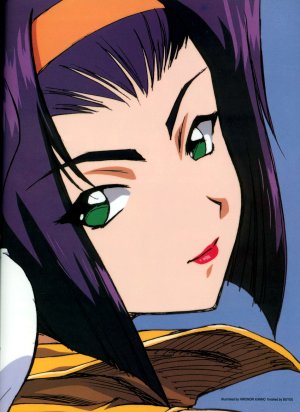
The low budget, simple settings and slightly eccentric pacing give this show the feeling of real life. The characterizations are top-notch. Much of the tension comes from just how stubborn both of the main characters are. That they're able to rely on each other anyway is sweet, and makes them an interesting and memorable BL pairing. But the writer also portrayed a great father-son relationship and gave a humorous insight into the differences between China's poor and nouveau riche. The music is also good, and I often don't notice music. (The "It's Okay That's Love" shout-out in one of the musical selections made me very happy.)
The greatest flaw in this series is also the thing that makes it most interesting: the censorship of many scenes and the fact that China banned gay content before the series could be finished. The romance never feels fully developed because censors eliminated not only sex but kissing. The end result is a show where the guys talk about sex frankly (okay, Guo Bai talks about it, gotta love that cheeky bugger), but we never even see an affectionate kiss between them. And the story ends abruptly with a cliffhanger and a ton of emotional issues unresolved between the guys.
Was this review helpful to you?

Was this review helpful to you?

There's also some good social commentary squeezed into this short drama. It's significant that the biggest conflict between Ji Soo and his gang-boss "father" is more about his homosexuality than his loyalty. The two heroes have very different experiences of being gay--Ji Soo has been bullied and humiliated for it, while Gitae has a loving sister who understood and accepted his sexuality when he was still in high school. Ji Soo's experience is far more common than Gitae's in Korea today. But that just made Gitae and his sister even more likable. Homophobia is so rife here in Korea that we really need some hopeful stories like this.
The usual web-drama caveats apply: the editing is hard to follow, the first episode is confusing, and of course, I wish it was longer. But I don't care. It's so amazing to find a Korean boys' love drama that's this good--plus it doesn't end in tragedy! And it's worth noting that the emotional aspects of the story are never confusing. While the extrinsic plot about the gangsters is sometimes unclear, the director and actors make sure we always know how the characters are feeling about their relationship. And that's what matters most.
I still have a billion questions: how the hell did Gitae get into this business in the first place? Why doesn't his sister know? How did Black Leopard and Black Rose find out the guys betrayed them and why didn't anyone think ahead about any of this? Why did-- Oh, never mind. Just be warned, it's that kind of story. But it's got a lot to offer: a plot that avoids many of the common BL cliches, a script where characters talk their problems out, some well-choreographed fight scenes, likable characters, cute actors and the sweetest, yet most hilarious, original sex scene I may have ever seen on screen. All that makes this a 9/10 despite the plot holes.
P.S. I liked it so much I paid money to download it from Vimeo. Show your support to filmmakers if you can afford to! I hope this studio can make further projects.
Was this review helpful to you?
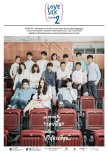
Story: Season 2 is when I gave up following the side stories. Too many confusing, uninteresting side characters. But Noh and Phun's story is 10/10. Season 2 takes time to go in depth as the boys figure out whether they have enough courage to commit to each other.
They both hate to let people down, and find it really difficult to contemplate breaking up with their girlfriends and defending their relationship to friends and family. But they can't escape the fact that they're really, really into each other. Even when they're on a beach vacation with their girlfriends.
Sometimes romance stories rely on weird contrived conflicts, but not this one. Even Noh and Phun's most stupid disagreements and misunderstandings make sense because of their underlying fear--the simple teenage fear of liking someone more than they like you, and the more difficult fear of being gay.
Acting: The actor who plays Phun started to grow on me in this season. Maybe he was acquiring acting skills on the job. And Captain, who plays Noh, seems to have visibly grown older by the end of the series. Both these guys just have so much sincerity and charisma, more than making up for their inexperience as actors.
They have solid chemistry on screen. Perhaps it's chemistry that comes mostly from great writing, editing and directing--these two don't have to do any intimate sex scenes like in a show like Together with Me, which would be a real test--but within this context they're completely convincing. Whether they're joking around, or Holding Hands Significantly, it's clear they want to be together. They make this show special.
Music: I still don't notice music one way or another, and don't count music in my evaluation.
Rewatch Value: I've already rewatched large portions of Phun/Noh's story, and I'll watch again when I need cheering up. The three-dimensional characters are likeable and sincere, and their relationship is refreshingly free of weird plot twists. It's easy to sympathize with their troubles and cheer for them when they find tender moments together (and they have a lot). I love a boys' love story that doesn't have too much angst--this fills the bill.
Was this review helpful to you?
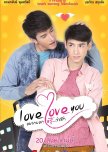
The central couple, Gump and Nai, are very cute, and the secondary characters include some major eye candy. The somewhat random editing and low budget give this movie a slice-of-life feel that I liked. The conflicts aren't too dramatic, which is nice. It's just a story about people feeling insecure in their relationships. It starts with the heroes in the middle of a relationship, not just starting out, which potentially makes for an interesting twist. I also really appreciated the portrayal of the relationship between Gump and his mom.
The downside is that the ending goes makjang and dramatic in a way that was out of place. I have a high tolerance for weird plot contrivances, but I felt cheated by this one. I don't know why the characters couldn't work things out on their own.
Also, it's unfortunate that Nai has more chemistry with his friend the secondary character than with Gump. This isn't a reflection on the actors, who are all doing a good job, but a fault of the script-writing and directing. They just made that kiss in the middle of the movie way too good, perhaps. They needed to work in another scene or two to show the chemistry between Nai and Gump, for those of us who haven't seen the first movie and aren't already invested in this couple staying together.
Was this review helpful to you?

A few things distinguish it:
1. A plot focused almost entirely on gay romance. Most of the side-plots are also connected to the topic of gay romance. The straight romance side
plot about Korn's sister is the only slow bit but luckily the show doesn't spend too much time on it.
2. The extremely hot chemistry between the lead actors--who are themselves, it should be mentioned, extremely hot.
3. Another reviewer mentioned this, but it bears repeating: this series doesn't mess around with the BL cliche of "I'm not gay, I just love you." Though this series doesn't spend any time parsing identities, there are some characters who it appears would describe themselves comfortably as gay and bisexual. This feels like a step into the twenty-first century. It also makes it easier to believe that these guys will stay together.
4. No messing around with BL cliches about semes and ukes. There are too many of these cliches to list, but the important thing is that Korn and Knock take turns pursuing and being pursued, acting tough and acting needy. And the guy on bottom wasn't necessarily who I expected.
5. The absurdity of the plot with the scheming girlfriend is balanced by the emotional weight that the guys bring to these roles. They really give a convincing impersonation of people falling in love. People discovering a connection that goes deeper than just really, really hot sex.
6. Yihwa is an awesome character as the female friend who ships these two and wants them to get together. She stands in for every BL fangirl ever.
7. I love Lazy Subber's subtitles for this show so much that I've sent her fan mail. How else would I learn about the dirty sexual implications of the Thai word for smoking a cigarette?
8. Also unusual--but in a scary way--is the subplot about Farm. This story was a nod to the dangerous side of a sexual coming of age story, but the resolution was rushed. I badly want another season so we can see Farm get over his trauma and find a nice guy.
Conclusion: A show I will never forget. Also an accessible, cliche-free gateway to Asian boys' love narratives for newbies from other cultures.
Was this review helpful to you?

The plot is a standard Thai rom com, with a lot of really absurd contrivances and a Scooby Doo sort of resolution.
I love absurd contrivances. But they have to be accompanied by three-dimensional characters, and that's where BR fails.
Interestingly, a few of the main characters became much more interesting in the subsequent prequel to BR, Together with Me. But here the heroine Yihwa just seems to be going through the motions of a rom com, with the equally uninteresting Cho.
I can see why many viewers thought the most interesting thing about this series was the side romance between male characters Knock and Korn. But this, too, falls flat compared to BL series with better scripts. The dialogue never gives us any insight into the personalities behind the squabbling. The actors playing Knock and Korn have occasional moments of chemistry, but they feel sparse. Their stiffness here is a world apart from their steamy performances in the prequel, Together with Me.
I'll admit, I skipped around a lot in this series. Life is short and I just couldn't watch every scene. There's too much bad dialogue and weak characterization.
Was this review helpful to you?

The only minor weakness here is that I wish the two parts were presented as one continuous movie. The ending of part 1 is great, though, and both parts are equally strong. I'll write more about pt 2 in a review for Friday-Sunday.
Was this review helpful to you?

This show does some awesome things that no other BL drama has attempted. Shi is a single dad with a seven-year-old daughter (played by a child actress who has just the right mix of sweetness and sass). This is a drama about divorce, falling in love when you have a child, and finding the right person to make a new family. A drama about a big, rarely explored topic: gay fatherhood.
This drama doesn't let us forget that it was made a few months after Taiwan's highest court ruled to make gay marriage legal. So ultimately, this is way more ambitious than another boys' love story--this is a drama trying to figure out gay families. And the closing images are so sweet and optimistic you will want to see happy gay families everywhere.
Also very cool: the biggest conflict between these two characters feels really true-to-life. It's about Fei's insecurities because of the bullying he endured as a gay kid in high school. If Shi is sometimes too pushy, Fei is sometimes too ashamed of himself--and this makes them a great pair.
These two characters were complicated, and I didn't agree with all their decisions. And like so many dramas, the first episodes have some choppy editing that's a little confusing. But this story was so interesting I want everyone to watch it so we can discuss it together!
P.S. I saw another reviewer complain about the kissing, but I thought it was pretty good. I mean, no one will ever be as convincing as Max and Tul in Together with Me, but I didn't have any complaints.
P.P.S. I'm rewatching it a second time and I keep thinking of more things I want to add to this review. It's that kind of show. It's sweet and beautiful and inspiring and totally awesome. Really.
Was this review helpful to you?
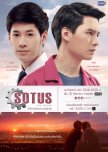
Was this review helpful to you?
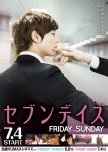
Seven Days is shonen ai (not yaoi), with an intense focus on the characters' emotions (and no sex). This will make it seem very slow to some viewers. In fact, I know some people will hate the long silences, the long lingering shots of people thinking. It's artistic and elegant. Not humorous or action-packed.
But other viewers will love how closely this movie gets into the characters' heads. Usually when movies use voice-over, it seems like a lazy way of story-telling. Just because the manga has characters telling us their thoughts doesn't mean a movie should drone on and on with voice-over. But it works here, perhaps because the characters present such restrained public faces. Hearing their thoughts, we can understand their doubts and misconceptions perfectly.
Or perhaps the whole movie works because the characters are three-dimensional and well-acted.
Or because the theme of knowing someone's appearance versus knowing their inner depths is so compelling? Or because the music is simple but builds slowly so you want to keep watching to the end of the scene?
I don't know, I just know that I couldn't stop watching.
I've talked a lot about what's in the characters' heads, but this drama also has passionate moments. The kissing scene on Saturday suggests the physical attraction between these two guys. Although BL stories can be notoriously oblivious to the realities of gay identity and "coming out"--and this is not a story about coming out, rather about falling in love--the actors body language makes this a plausible story of queer love. It's not one of those "I love girls but I love you more" stories that haunt BL manga. Overall, a great romance!
Was this review helpful to you?

Story: The first episode was disorganized and confusing. So many minor characters appear and disappear. Some of them will reappear several episodes later and you have no idea who they are. Throughout the series, it was hard to understand the secondary plot-lines. The only benefit of the side plots is they help us understand the world Noh and Phun live in, a world of really rich, privileged teenagers, who don't have a lot of parental supervision. These high schoolers spend a lot of time partying and drinking--and there's even a teenage girl who lives with her boyfriend.
But forget the side-plots: Noh and Phun's relationship is the entire reason for watching, re-watching, and forever adoring this show. It's a really sweet boys' love story. It starts with a weird contrivance, but the show doesn't rely on plot devices. It quickly becomes a character-driven story about two boys coming of age. The story is told in a relatively naturalistic way (for Asian TV), and feels believable. The end of the first season did annoy me, but the second season redeemed the show, and now I can rewatch the first season with pleasure.
Acting: As far as I can gather, all the actors and actresses in this show were pretty inexperienced when they were discovered in open casting calls. None of them were familiar faces and none of them expected to be stars. Their inexperience actually makes their performances really endearing. The actor playing Noh was 17 when they filmed season 1, and he looks very young. This isn't one of those series where the high school characters are played unconvincingly by 30-year-olds. And this isn't a BL show where the guys are beefcake hunks in their twenties (like Together with Me). These guys have one foot in childhood and one in adulthood, and that just makes me care about them more as a viewer.
Lots of credit goes to the director for taking these novice actors and helping them portray a variety of emotions. The actor playing Phun doesn't always convince me, but Noh--whose eyes we see the story through--is never anything less than fascinating. He makes me remember how scary it was to be 17 and dealing with teenage emotions.
Music: I don't remember anything distinctive about the music, probably because I don't care about the music in a show (unless it's super annoying).
Rewatch Value: I can't rewatch the side stories, but I'll definitely rewatch the BL edit focused on Noh and Phun. Their relationship is really well-written, especially in later episodes once they realize their attraction to each other. They react to their feelings in ways that match their personalities; and they alternately pursue and retreat from each other in totally believable ways. I particularly like that Love Sick avoids the manga cliche plotline of a smartass seme pursuing an innocent uke. Both these guys take turns being smartass and innocent. It doesn't take too many episodes for both of them to recognize their feelings, even if they aren't sure what to do. And season 1 sets the stage for a fantastic season 2.
Was this review helpful to you?
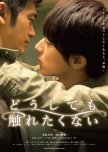
A second disappointment for me was that the humor of the original work is completely missing from this adaptation. The original balances its angst with a wry, subtle sense of humor (which runs throughout even Yoneda Kou's most brutal works). The humor was, however, omitted here.
This is an example of how an adaptation can lose the spirit of the original by being overly faithful to the details. Some fans will like this faithfulness, but I found myself wishing I'd spent these 90 minutes rereading the book.
Was this review helpful to you?

SOTUS S is a good series for people who want their BL to be PG-rated, innocent and sweet. Though there's less conflict in this season than in the first season, the characters are arguably more likable. I got bored by some of the workplace stuff in early episodes, but later episodes had good pacing. Not one that I'll rewatch, but it was worth my time once.
Was this review helpful to you?

This is the rare BL story that takes place in a realistic world--complete with homophobic classmates, teachers and parents--yet still manages to provide some hope and sweetness for our young lovers, Chen and Wan. The depictions of homophobia are upsetting, so brace yourself. The secondary story line, about a gay boy who tries to commit suicide after repeated bullying, is a reminder that it's dangerous simply to be gay in many situations. And it gives us context for understanding Chen's attempt to hide his sexuality--to virtually hide his entire personality. The actor who plays Chen is so low-key he's sometimes guilty of underacting. But this fits with Chen's restrained, introverted, cautious personality. This emotional restraint is the opposite of Wan's enthusiasm and eagerness.
It's great to see a BL story where the characters are the same age and have such complementary personalities. Too many romances are based around power imbalances or personalities that bring out the worst in each other. (HIStory: Obsessed and HIStory: Right or Wrong, I'm looking at you.)
The format (eight 12-minute episodes) could have been a weakness, but "Red Balloon" does better with its short run-time than other web dramas. The first episode is slightly confusing, because we meet the characters in the present before the main story shifts to events in 2003. A few scenes would benefit from more length or detail, especially when secondary characters are first introduced. But that's all I can come up with for critiques.
The best thing about "Red Balloon" is that the frame story, which shows Chen and Wan as adults, asks us to think beyond a simple romance of star-crossed lovers and consider the cost homophobia exacts from families. LGBTQ individuals are often portrayed as threats to the traditional family. But in "Red Balloon" the greatest threat to families is the homophobia that forces people into sexless heterosexual marriages. "Red Balloon" came out in the year that Taiwan passed legislation that will allow gay marriage to become a reality. In that context it makes a good argument that gay marriage laws make for stronger families. (Stay around after the credits of the final episode for one final scene about Chen's ex that reiterates this point.)
Icing on the cake: the soundtrack. It uses some indie songs with beautiful melodies. They contribute to the emotions even for people like me who don't understand the Chinese lyrics.
Was this review helpful to you?

